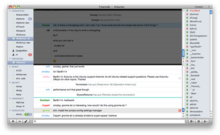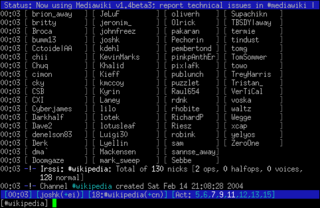
Irssi is an IRC client program for Linux, FreeBSD, macOS and Microsoft Windows. It was originally written by Timo Sirainen, and released under the terms of the GNU General Public License in January 1999.

ChatZilla is an IRC client for Mozilla-based browsers such as Firefox, introduced in 2000. It is cross-platform open source software which has been noted for its consistent appearance across platforms, CSS appearance customization and scripting.
Trillian is a proprietary multiprotocol instant messaging application created by Cerulean Studios. It is currently available for Microsoft Windows, Mac OS X, Linux, Android, iOS, BlackBerry OS, and the Web. It can connect to multiple IM services, such as AIM, Bonjour, Facebook Messenger, Google Talk (Hangouts), ICQ, IRC, XMPP (Jabber), VZ, and Yahoo! Messenger networks; as well as social networking sites, such as Facebook, Foursquare, LinkedIn, and Twitter; and email services, such as POP3 and IMAP.
The history of macOS, Apple's current Mac operating system originally named Mac OS X until 2012 and then OS X until 2016, began with the company's project to replace its "classic" Mac OS. That system, up to and including its final release Mac OS 9, was a direct descendant of the operating system Apple had used in its Macintosh computers since their introduction in 1984. However, the current macOS is a Unix operating system built on technology that had been developed at NeXT from the 1980s until Apple purchased the company in early 1997.

iChat is a discontinued instant messaging software application developed by Apple Inc. for use on its Mac OS X operating system. It supported instant text messaging over XMPP/Jingle or OSCAR (AIM) protocol, audio and video calling, and screen-sharing capabilities. It also allowed for local network discussion with users discovered through Bonjour protocols.
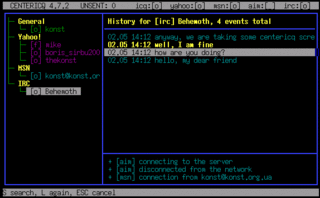
Centericq is a text mode menu- and window-driven instant messaging interface that supports the ICQ, Yahoo!, AIM, MSN, IRC, XMPP, LiveJournal, and Gadu-Gadu protocols. It allows you to send, receive, and forward messages, URLs, SMSes, contacts, and email express messages, and it has many other useful features. Known to work in Linux, FreeBSD, NetBSD, OpenBSD, Solaris, Windows and macOS/Darwin Operating Systems.

Mac OS X version 10.0 is the first major release of Mac OS X, Apple’s desktop and server operating system. Mac OS X 10.0 was released on March 24, 2001 for a price of US$129. It was the successor of the Mac OS X Public Beta and the predecessor of Mac OS X 10.1.

The Mac OS X Public Beta was the first publicly available version of Apple Computer's Mac OS X operating system to feature the Aqua user interface. It was released to the public on September 13, 2000 for US$29.95. Its release was significant as the first publicly available evidence of Apple's ability to ship the long-awaited "next-generation Mac operating system" after the Copland and Rhapsody failures. It allowed software developers and early adopters to test a preview of the upcoming operating system and develop software for the forthcoming operating system before its final release. The US version had a build number of 1H39 and the international version had build number 2E14.

Colloquy is an open-source IRC, SILC, ICB and XMPP client for Mac OS X. Colloquy uses its own core, known as Chat Core, although in the past it used Irssi as its IRC protocol engine. One of the primary goals behind Colloquy was to create an IRC, SILC and ICB client with Mac OS X visuals. Colloquy contains a user interface that follows Apple's Human interface guidelines in addition to containing support for traditional IRC command-line controls such as /nick and /join.

BitlBee is a cross-platform IRC instant messaging gateway, licensed under the terms of the GNU General Public License.
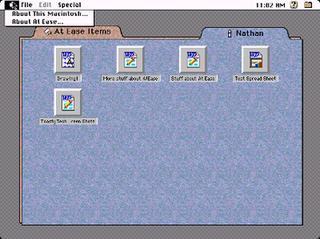
At Ease was an alternative to the Macintosh desktop developed by Apple Computer in the early 1990s for the classic Mac OS. It provided a simple environment for new Macintosh users and young children to help them to work without supervision. At Ease sits on top of the Finder desktop, providing a simple tabbed panel-oriented graphical user interface in which applications and documents are represented by icons on large buttons. Aside from its security features, its interface and basic functionality is very similar to the Packard Bell Navigator.

djay is a digital music mixing software program for Mac OS X, Microsoft Windows, iPad, iPhone, and iPod touch created by the German company algoriddim. It allows playback and mixing of digital audio files with a user interface that tries to simulate the concept of "two turntables and a microphone" on a computer. Before the commercial release in November 2007, djay had initially been released as freeware in June 2006. In December 2010 the software was also released for the iPad, and subsequently for iPhone and iPod touch in March 2011.
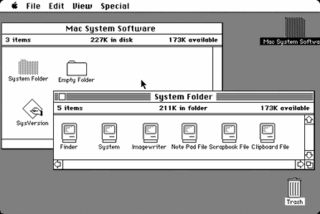
The family of Macintosh operating systems developed by Apple Inc. includes the graphical user interface-based operating systems it has designed for use with its Macintosh series of personal computers since 1984, as well as the related system software it once created for compatible third-party systems.

WeeChat is a free and open-source Internet Relay Chat client, which is designed to be light and fast. It is released under the terms of the GNU General Public License 3 and has been developed since 2003.

Simplenote is a note-taking application with markdown support. In addition to cross-platform apps, it can be accessed via most web browsers.
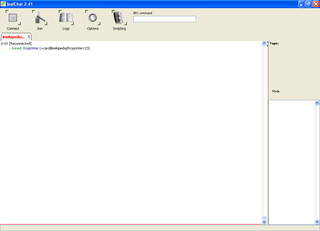
LeafChat is a free IRC client for Microsoft Windows and Unix-like operating systems, licensed under the GNU GPL. A donation is requested.
Outline is a note-taking application, available on iOS and OS X platforms. It is being developed by Gorillized Corporation, specializing in Productivity and Business apps for Apple devices. The distinguishing features of Outline are design, hierarchy, free placement of notes as in a paper notebook, support of various types of content, synchronization options and Microsoft OneNote compatibility.
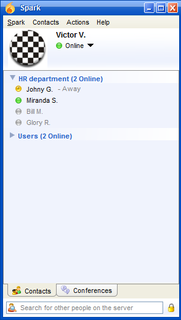
Spark is an open-source instant messaging program that allows users to communicate via text in real time. It can be integrated with the Openfire server to provide additional features, such as controlling various parts of Spark functionality from a central management console, or integrating with a customer support service Fastpath, allowing Spark users to log into queues, accept and forward support requests, use canned responses. Being a cross-platform application, it can be run on various systems. Installers for Windows, macOS and Linux are available on the official website.

